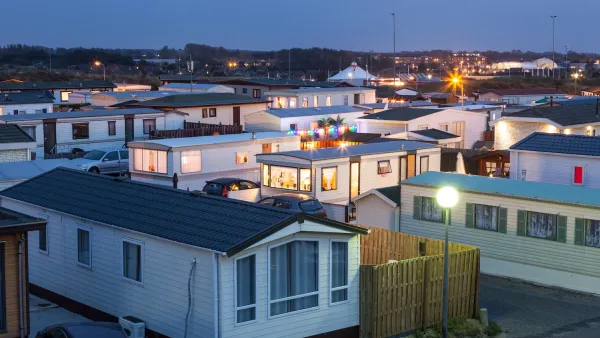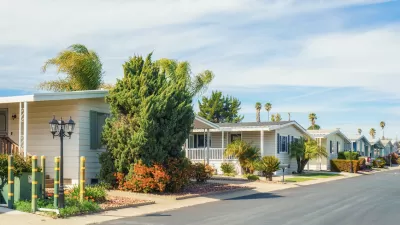It’s time to rethink the negative stereotypes and acknowledge the key role mobile home parks can play in solving the affordable housing crisis.

Stereotypes about manufactured housing are stifling a robust source of affordable housing. This is what Zachary Lamb, Jason Spicer, and Linda Shi argue in The Conversation, pointing out that “many people, including urban planners and affordable housing researchers, see manufactured housing parks as problems” rather than one solution to the housing crisis.
The authors outline and debunk four major stereotypes about mobile homes:
- “Manufactured housing is shoddy:” In fact, manufactured homes have to meet federal safety standards, and “Many quality problems associated with manufactured housing arise from home installation, park maintenance and infrastructure issues.”
- Manufactured housing is exploitative: While land leases can put residents at the mercy of landlords, as we have covered before, Resident Owned Communities offer a model that puts ownership and control in the hands of the people who live in the parks.
- Lack of density: The density of mobile home parks is often higher than surrounding neighborhoods, and 61 percent of manufactured housing is located in urban areas.
- Mobile home parks are isolated: While this is in some cases true, the authors point out that “this pattern applies to most U.S. residential neighborhoods built since World War II, including gated communities and cul-de-sacs,” and mobile home parks are often further isolated by local zoning regulations.
The article outlines the real obstacles to manufactured housing: an eagerness on the part of local officials to convert the land to “better” uses, the purchase of mobile home parks by investors, climate change and extreme weather, and aging infrastructure.
Some states are implementing solutions to make manufactured housing communities more sustainable, resilient, and affordable. At the federal level, “The Biden administration’s 2022 housing plan includes extensive support for manufactured housing parks.” The authors suggest coupling current efforts with legislation that expands tenant protections and supports opportunities for resident-owned and cooperative models to support more stable and resilient communities.
FULL STORY: Debunking stereotypes about mobile homes could make them a new face of affordable housing

Planetizen Federal Action Tracker
A weekly monitor of how Trump’s orders and actions are impacting planners and planning in America.

San Francisco's School District Spent $105M To Build Affordable Housing for Teachers — And That's Just the Beginning
SFUSD joins a growing list of school districts using their land holdings to address housing affordability challenges faced by their own employees.

The Tiny, Adorable $7,000 Car Turning Japan Onto EVs
The single seat Mibot charges from a regular plug as quickly as an iPad, and is about half the price of an average EV.

With Protected Lanes, 460% More People Commute by Bike
For those needing more ammo, more data proving what we already knew is here.

In More Metros Than You’d Think, Suburbs are Now More Expensive Than the City
If you're moving to the burbs to save on square footage, data shows you should think again.

The States Losing Rural Delivery Rooms at an Alarming Pace
In some states, as few as 9% of rural hospitals still deliver babies. As a result, rising pre-term births, no adequate pre-term care and "harrowing" close calls are a growing reality.
Urban Design for Planners 1: Software Tools
This six-course series explores essential urban design concepts using open source software and equips planners with the tools they need to participate fully in the urban design process.
Planning for Universal Design
Learn the tools for implementing Universal Design in planning regulations.
Smith Gee Studio
City of Charlotte
City of Camden Redevelopment Agency
City of Astoria
Transportation Research & Education Center (TREC) at Portland State University
US High Speed Rail Association
City of Camden Redevelopment Agency
Municipality of Princeton (NJ)





























